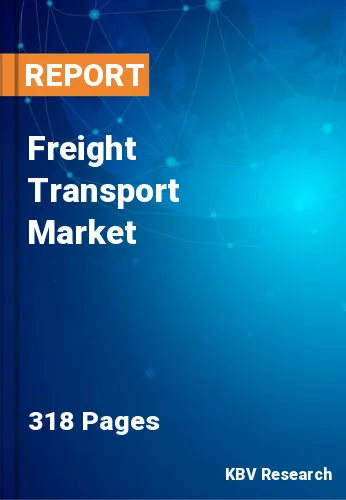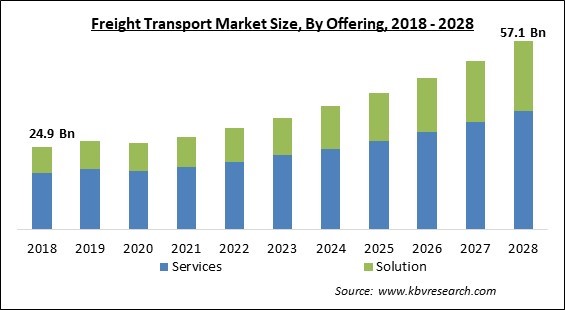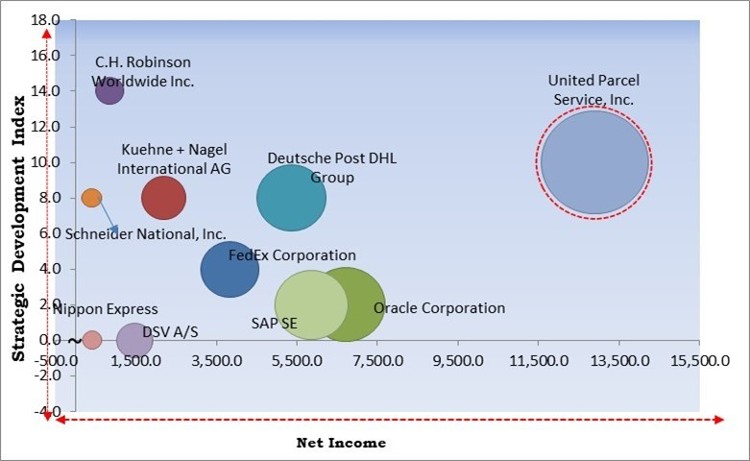
The Global Freight Transport Market size is expected to reach $57.1 billion by 2028, rising at a market growth of 10.8% CAGR during the forecast period.
The total movement of products over an inland transportation network is referred to as freight transport. All supply chains and logistical systems rely heavily on freight transportation. The market's growth is linked to the affordable shipping costs set by suppliers of freight transport services and the many free trade agreements between nations.

For instance, Canada and the European Union agreed to a thorough economic trade pact. 98% of the tariffs on European goods traded across Europe and Canada are being eliminated by the Canadian government as a result of this agreement. By lowering commodity prices, which naturally boosts demand for freight transportation, such agreements help the freight transport market expand.
Many freight transportation management solutions, including fleet tracking & maintenance, warehouse management system, security & monitoring system, and 3PL solutions, can be used to address logistics issues because end-users and manufacturers in developing nations, like India, lack the internal control necessary to do so. This aspect stimulates the development of the target market as a whole.
Additional factors driving the demand for specialist freight transport and supply chain execution competencies include the expansion of e-commerce and entrepreneurial endeavors. Because logistics, inventory, and fixed expenses are reduced when shippers hire freight transportation services, they benefit.
Numerous businesses have outsourced their freight transport operations as a result of globalization since they are unable to manage global supply chain activities. Cargo transportation businesses offer better and more creative ways to maximize the efficiency of their services, offering benefits including lower capital costs, door-to-door service, flexibility, and a lower chance of damage during transit.
Global supply chain activities have been adversely affected by the COVID-19 pandemic. The crisis put unheard-of pressure on the logistics and transportation systems. Lockdowns were put into place in a number of nations, which caused uncertainty for the shippers while shipping their products. The logistics networks were disturbed by the imbalance between supply and demand, along with the lack of long-haul and last-mile fulfillment service capacity, which limited the growth of the freight transport sector. A decline in consumption has also been seen on the demand side.
It is anticipated that rapid industrialization and the growing adoption of Industry 4.0 will enable the manufacture of high-quality goods at low cost. Road freight transportation is the best option for Industry 4.0 since it provides flexible and more affordable short-distance transit. Additionally, the demand for food, beverages, and other consumer goods is anticipated to rise with population growth, supporting market growth. The future of the global supply chain is finally beginning to be shaped by Industry 4.0 as a true driving force. Thus, the market for freight transportation is driven by the growing use of Industry 4.0.
In particular, the logistics sector has seen an increase in the need for on-time delivery, which has evolved into a crucial differentiator among its rivals. The market has grown due to the introduction of numerous technologies in freight transportation for efficient management of the transportation process. One-third of the cost of logistics is accounted for by transportation management, which has a significant impact on how well the market as a whole performs. For brands, increased client retention is facilitated by on-time delivery. As a result, the market for freight transportation is driven by the rising need for on-time delivery.
As pandemic restrictions were eased and passenger and cargo traffic picked up after a historic fall in 2020, world Co2 emissions from the transport industry recovered in 2021, rising by 8% to over 7.7 Gt CO2. a number of variables, including the increased carbon emissions brought on by the usage of diesel fuel in road transportation. Transport emissions are rising far more quickly than GDP in many emerging nations. Thus, the growth of the freight transportation market is being hampered by rising carbon emissions.
Based on offering, the market is categorized into Solutions and Services. In 2021, the service segment accounted for a large share of the revenue. On the basis of service offerings, the service segment is further categorized into Managed services, business services, and system integration. The demand for freight management services, which help companies deliver freight and complete the supply chain effectively and economically, is primarily responsible for the segment's rise.

Based on the mode of transportation, the market is categorized into railways, roads, seaways, and aviation. During the forecast period, it is anticipated that the Seaways & airways segment will develop at a promising rate. The adoption of sustainable aviation fuels in response to climate change, speedier delivery, and rapid airport building in developing nations are all factors contributing to the growth of this market.
Based on verticals, the market is categorized into Retail & E-commerce, Automotive, Aerospace & Defense, Pharmaceuticals, Energy, and Others. The pharmaceutical segment is anticipated to expand at significant growth during the anticipated period. The most important link in a logistical network is pharmaceutical transport since the commodities being delivered are meant for human consumption. To guarantee that the drugs are delivered to the end user in the proper manner, total control over the entire distribution chain is necessary.
| Report Attribute | Details |
|---|---|
| Market size value in 2021 | USD 28.1 Billion |
| Market size forecast in 2028 | USD 57.1 Billion |
| Base Year | 2021 |
| Historical Period | 2018 to 2020 |
| Forecast Period | 2022 to 2028 |
| Revenue Growth Rate | CAGR of 10.8% from 2022 to 2028 |
| Number of Pages | 318 |
| Number of Tables | 502 |
| Report coverage | Market Trends, Revenue Estimation and Forecast, Segmentation Analysis, Regional and Country Breakdown, Competitive Landscape, Companies Strategic Developments, Company Profiling |
| Segments covered | Offering, Mode of Transport, Vertical, Region |
| Country scope | US, Canada, Mexico, Germany, UK, France, Russia, Spain, Italy, China, Japan, India, South Korea, Singapore, Malaysia, Brazil, Argentina, UAE, Saudi Arabia, South Africa, Nigeria |
| Growth Drivers |
|
| Restraints |
|
Based on geography, the market is categorized into North America, Europe, Asia Pacific, and LAMEA. North America dominated the global market in 2021 and is predicted to maintain its dominance during the forecast period. Due to the presence of numerous significant logistics businesses, e-commerce behemoths, and suppliers of freight solutions in the United States and Canada. The continuing development and uptake of emerging technologies like artificial intelligence, machine learning, and near-field communication also contribute to the expansion of the market.
Free Valuable Insights: Global Freight Transport Market size to reach USD 57.1 Billion by 2028

The major strategies followed by the market participants are Partnerships. Based on the Analysis presented in the Cardinal matrix; United Parcel Service, Inc. is the forerunner in the Freight Transport Market. Companies such as Oracle Corporation, FedEx Corporation, and SAP SE are some of the key innovators in Freight Transport Market.
The market research report covers the analysis of key stake holders of the market. Key companies profiled in the report include C.H. Robinson Worldwide, Inc., Deutsche Post DHL Group (The Deutsche Post AG), FedEx Corporation, Kuehne + Nagel International AG (Kuehne Holding AG), United Parcel Service, Inc., SAP SE, Oracle Corporation, Schneider National, Inc., DSV A/S, and Nippon Express Co., Ltd.
By Offering
By Mode of Transport
By Vertical
By Geography
The global Freight Transport Market size is expected to reach $57.1 billion by 2028.
Rapid Industrialization And Increasing Acceptance Of Industry 4.0 are driving the market in coming years, however, Increased Carbon Emissions restraints the growth of the market.
C.H. Robinson Worldwide, Inc., Deutsche Post DHL Group (The Deutsche Post AG), FedEx Corporation, Kuehne + Nagel International AG (Kuehne Holding AG), United Parcel Service, Inc., SAP SE, Oracle Corporation, Schneider National, Inc., DSV A/S, and Nippon Express Co., Ltd.
The expected CAGR of the Freight Transport Market is 10.8% from 2022 to 2028.
The Roadways segment acquired maximum revenue share in the Global Freight Transport Market by Mode of Transport in 2021 thereby, achieving a market value of $34.4 billion by 2028.
The North America market dominated the Global Freight Transport Market by Region in 2021, and would continue to be a dominant market till 2028; thereby, achieving a market value of $19.4 billion by 2028.
Our team of dedicated experts can provide you with attractive expansion opportunities for your business.
